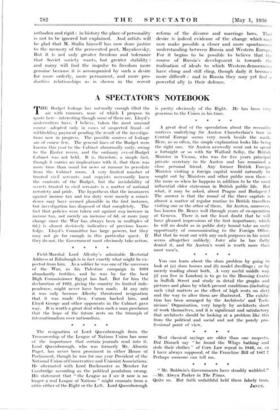A SPECTATOR'S NOTEBOOK
THE Budget leakage has naturally enough filled the air with rumours, none of which I propose to quote here—interesting though some of them are. Lloyd's underwriters have, I believe, taken the most unusual course—adopted only in cases of suspected fraud—of wit hholding payment pending the result of the investiga- tions now in progress. The possible sources of leakage arc of course few. The general lines of the Budget were known this year to the Cabinet abnormally early, owing to the Easter recess, and the ordinary eve-of-Budget Cabinet was not held. It is, therefore, a simple fact, though it carries no implications with it, that there was more time than usual for news or rumour to percolate from the Cabinet room. A very limited number of trusted civil servants and copyists necessarily knew the contents of the Budget, but the inviolability of secrets trusted to civil servants is a matter of national notoriety and pride. The hypothesis that the insurances against income tax and tea duty were merely a coinci- (knee may have seemed plausible in the first instance, but investigation has disposed of that completely. The fact that policies were taken out against any increase in income tax, not merely an increase of 6d. or more (any change since the War has always been in multiples of 6d.) is almost decisively indicative of previous know- ledge. Lloyd's Committee has large powers, but they may not go far enough in this particular quest. If they do not, the Government must obviously take action.
* * * * Field-Marshal Lord Allenby's admirable Rectorial Address at ,Edinburgh is in fact exactly what might be ex- pected from him. As a soldier he was one-of the successes of the War, as his Palestine campaign in 1918 abundantly testifies, and he was by far the best High Commissioner Egypt has had. But for him the declaration of 1922, giving the country its limited inde- pendence, might never have been made. At any rate it was only because Allenby threatened resignation that it was made then. Curzon backed him, and Lloyd George and other opponents in the Cabinet gave wad'. It is worth a great deal when such a man proclaims that the hope of the future rests on the triumph of internationalism over nationalism.
The resignation of Lord Queenborough from the Treasurership of the League of Nations Union has none of the importance that certain journals read into it. Lord Queenborough, who was formerly Mr. Almeric Paget, has never been prominent in either House of Parliament, though he was for one year President of the National Union of Conservative and Unionist Associations. He alternated with Lord Buckmaster as Member for Cambridge according as the political pendulum swung. His statement that " the League as I see it now is no longer a real League of Nations " might emanate from a Critic either of the Right or the Left. Lord Queenborough is pretty obviously of the Right.. He .has- been very generous to the Union in his time.
* * * * A great deal of the speculation about the recondite motives underlying Sir Austen Chamberlain's tour in Central Europe seems very much beside the mark. Here, as so often, the simple explanation looks like being the right one. Sir Austen avowedly went out to spend a fortnight or so with Sir Walford Selby, the British Minister in Vienna, who was for five years principal private secretary to Sir Austen and has remained a close personal friend. Any former British Foreign Minister visiting a foreign capital would naturally be sought out by Ministers and other public men there— the more so when he happens in addition to be the most influential elder statesman in British public life. But what, it may be asked, about Prague and Budapest ? The answer is that the round of the three capitals is almost a matter of regular routine to British travellers visiting one or the other of them. Sir Austen, moreover, has known Dr. Benes well through years of ea-operation at Geneva. There is not the least doubt that he will have gleaned impressions of the first importance, which he will no doubt as in public duty bound take an early opportunity of communicating to the Foreign Office. But that he went out with any such purposes in his mind seems altogether unlikely. Inter alia he has flatly denied it, and Sir Austen's word is worth more than most men's.
* * * *
•
You can learn about the slum problem by going to look at (a) slum houses and (b) model dwellings ; or by merely reading about both. A very useful middle way (if you live in London) is to go to the Housing Centre in Suffolk Street and study in detail the graphs and pictures and plans by which present conditions (including such vital matters as the effect of high rents on diet) and the way to alter them are illustrated. The exhibi- tion has been arranged by the Architects' and Tech- nicians' Organisation, very largely by architects short of work themselves, and it is significant and satisfactory that architects should be looking at a problem like this from the political and social and not the purely pro- fessional point of view.
*
Most classical sayings are older than one suspects. Did Disraeli say " he found the Whigs bathing and stole their clothes " of Corn Law repeal in 1846, or, as I have always supposed, of the Franchise Bill of 1867 ? Perhaps someone can tell me.
* • * * " Mr. Baldwin's Governments have steadily wobbled." —Mr. Alwyn Parker in The Times.
Quite so. But faith unfaithful held them falsely true.














































 Previous page
Previous page